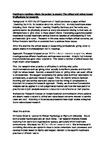Healthcare meetings where the patient is absent: The ethical and values based implications for research
| dc.contributor.author | Smart, Cordet | |
| dc.contributor.author | Madeleine, T | |
| dc.contributor.author | Mhlanga, S | |
| dc.contributor.author | Dickenson, J | |
| dc.date.accessioned | 2018-08-13T13:17:25Z | |
| dc.date.available | 2018-08-13T13:17:25Z | |
| dc.date.issued | 2016-09-06 | |
| dc.identifier.uri | http://hdl.handle.net/10026.1/12056 | |
| dc.description.abstract |
Background: In 2012 the UK Department of Health produced a paper entitled: ‘Liberating the NHS: No decision about me, without me’. In many healthcare areas including: Adult Mental Health, Learning Disability Services, and Dementia care, patients cannot be physically present at every conversation relating to their care, so clinicians have to ‘give voice’ to these absent clients. Developing a genuinely patient experience focused healthcare service therefore requires an understanding of how professionals ‘give voice’. Research in this area raises multiple ethical concerns, yet limited literature identifies or considers how to address these issues. Aims: We examine the ethical issues of researching professionals ‘giving voice’ to absent clients in multidisciplinary (MDT) meetings. Approach: The paper is based on our ‘MDTs in Action’ research programme, where meetings across different healthcare services were recorded. Analytic foci included how professionals gave voice to patients. This raised a number of ethical issues that might inform other research. First, the research drew attention to difficulties in defining what policy recommendations such as ‘giving voice’ actually looks like in practice and how this might be values based. Second, a research focus on ‘giving voice’ can seem critical to professionals. We suggest recognising that giving voice is difficult was helpful for professionals, at particular research stages. Third, we identify tensions between involving staff and service users and explore how the timing of consultations is important for a respectful research approach. Finally, we show how Conversation Analysis can be applied in a non-judgemental manner and how this was useful for practitioners in joint analysis sessions to become more reflective on their practice. Implications: Research focused on interprofessional communication where patients are absent needs to attend to ethical and value-based concerns relevant to service users and staff. Attending to those issues presented here might enable strengthen future values based research. | |
| dc.language.iso | en | |
| dc.title | Healthcare meetings where the patient is absent: The ethical and values based implications for research | |
| dc.type | conference | |
| plymouth.date-start | 2016-09-06 | |
| plymouth.date-finish | 2016-09-09 | |
| plymouth.conference-name | All Together Better Health | |
| plymouth.organisational-group | /Plymouth | |
| plymouth.organisational-group | /Plymouth/Faculty of Health | |
| plymouth.organisational-group | /Plymouth/Faculty of Health/School of Psychology | |
| dc.publisher.place | Oxford University | |
| dcterms.dateAccepted | 2016-04-11 | |
| dc.rights.embargodate | 2023-7-19 | |
| dc.rights.embargoperiod | Not known | |
| rioxxterms.licenseref.uri | http://www.rioxx.net/licenses/all-rights-reserved | |
| rioxxterms.licenseref.startdate | 2016-09-06 | |
| rioxxterms.type | Conference Paper/Proceeding/Abstract |


